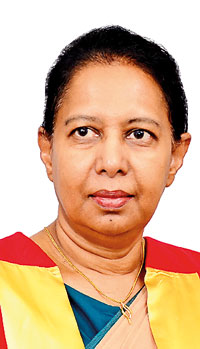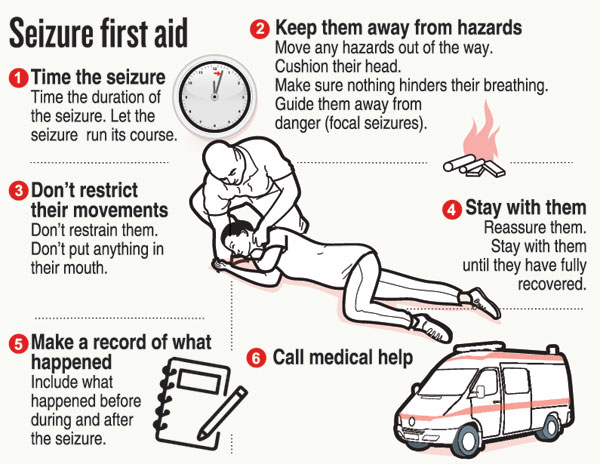Epilepsy: Importance of recognising symptoms
View(s):
Dr. Sunethra Senanayake
A video shows a child asleep on a bed. Subtly and slightly there is movement of her left arm and leg.
No major convulsions, no dramatic seizures and no frothing from the mouth.
This too is an episode of epilepsy, says Consultant Neurologist Dr. Sunethra Senanayake of the National Hospital of Sri Lanka (NHSL), as the world celebrated Epilepsy Day on February 10, this year.
“This is why proper diagnosis and treatment is vital,” she says, reiterating that children, teenagers and adults with epilepsy can lead normal lives without hindrance, as long as they follow medical advice and take their medications scrupulously.
Quoting the World Health Organization (WHO), Dr. Senanayake says that epilepsy is the “most common” chronic brain disease and affects people of all ages. More than 50 million people worldwide have epilepsy and nearly 80% of them live in low- and middle-income countries. Around 70% of people with epilepsy could be seizure-free if properly diagnosed and treated.
Looking at the situation in Sri Lanka, she points out that there are no national statistics on the prevalence of epilepsy, but around the world – which would also be true to this country – the WHO has estimated the proportion of the general population with active epilepsy at a given time to be between 4 and 10 per 1,000 people.
What is important is to recognise the symptoms of epilepsy in children/teenagers as well as adults and get them treated. Unfortunately, she says, there is much stigma and discrimination and people also tend to hide the fact that they may be living with epilepsy as it has an impact on their lives, their families and their marriages.
“There are many myths and fears surrounding this disease which need to be dispelled,” says Dr. Senanayake.
With seizures in epilepsy being the result of excessive discharges in a group of brain cells, this Neurologist gives the major symptoms as:
n Recurrent seizures – brief episodes of involuntary movement that may involve a part of the body (focal) or the entire body (generalized). There could be loss of consciousness and loss of control of bowel or bladder function at this time.
In such seizures, the person falls to the floor in convulsions and passes out, she says.
 But, cautions Dr. Senanayake, many of those who are living with epilepsy do not have these typical major symptoms. What people, especially teachers, need to know is that there could also be minor but common symptoms which manifest as:
But, cautions Dr. Senanayake, many of those who are living with epilepsy do not have these typical major symptoms. What people, especially teachers, need to know is that there could also be minor but common symptoms which manifest as:
- Staring into space
- Lip-smacking
- Arm and leg jerking
- Blurry vision or a brief loss of hearing
Delving in-depth, she explains that the person loses awareness and becomes unresponsive; gets into a “dreamy” state, with movements of part of the body. Sometimes the person may say that he/she heard different voices, saw different things as opposed to what was actually happening at that time or that he/she has been to a “place” not gone before, something out of reality. “This is completely different to the mee-masmore (epilepsy) that most people are accustomed to seeing.”
There is danger of accidents to epilepsy sufferers and these could include falls, serious injury such as fractures, getting burnt and drowning, with premature death among them being three times higher than in the general population, she adds.
MediScene learns that the cause of the illness is not known in about 50% of those living with epilepsy, but in others may be attributable to brain damage from prenatal or perinatal causes (a loss of oxygen or trauma during birth, low birth weight); congenital abnormalities or genetic conditions with associated brain malformations; a severe head injury; a stroke that restricts the amount of oxygen to the brain; an infection of the brain such as meningitis and encephalitis; certain genetic syndromes; and a brain tumour.

| What should be done? If parents notice subtle movements of the body, starting on one side and remaining on that side, with loss of awareness or teachers see a child in a dreamy state, it is best to seek a medical evaluation, says Dr. Sunethra Senanayake, explaining that the more dramatic signs would be identified by those around the patient quickly. She points out that as the child who has undergone this episode may not remember, it would be good for parents to record it on a mobile phone, so that doctors would see the realistic picture. If there are repeated episodes of this nature – more than two within 24 hours, it may be a pointer towards epilepsy. “Seek medical help. It would be good if the patient is accompanied by someone who saw the episode,” she says, assuring that there is treatment. Dr. Senanayake says: “When promptly diagnosed, if it is epilepsy, the person should follow the medication regimen given by the doctor. He/she should not stop the medication on a whim. Those living with epilepsy can lead a normal life – study, work, get married, have children and go on holidays. However, if you drive a vehicle, you need to be careful and you should not do certain activities such as swimming alone.” To those who may witness someone having an epileptic episode, her advice is:
| |


